23andMe can tell you something about your ancestry and can scare the crap out of you from all the genetic disease risks you might have, but can it also say something about your longevity? Scientists have also looked at the same kind of data 23andMe generates about you, and happen to have found three very important places in your genome that might say something about how long you’ll live1.
These three places in your genome are in just two genes: the stress response related FOXO3 and the cholesterol related APOE. The genetic locations, called ‘single nucleotide polymorphisms,’ or ‘SNPs’ for short, were found to have certain nucleotides (which are Gs, Ts, As, or Cs, the famous genetic code) be more commonly present in people of advanced age throughout the world. That means they might help you reach that age if you have them too.
So what are they? Long lived people tend to have more ‘T’s in the SNP ‘rs7412,’ less ‘C’s in the SNP ‘rs429358’, and more ‘G’s in the SNP ‘rs2802292’. If you have 23andMe, you can look up these SNPs yourself by using the search tool in the online raw data browser. Let’s assume the ones below are mine. Note, at each position you have two letters possible, because you come from two parents:

It looks like I have one of the beneficial APOE variants (a T at rs7412), none of the bad ones (no Cs at rs429358) and one showing FOXO3 benefits (a G at rs2802292). Now what? Here comes the difficulty with genetic associations, because associations are just that: correlations and not causations. It’s tempting to say that I’ll be slightly better off than average for having a long life though, since at least partially beneficial genetic variants where in my genome. That’s about as good as a placebo – but hey, placebos work sometimes too. In any case, it opens up a more philosophical question:
How much of lifespan is genetic?
Well a mouse will live a lot shorter than you, though it might live in your house and even eat the same food as you (different genes, same environment). So that sounds like it’s completely genetic. Meanwhile, if you had an identical twin that smoked, had a terrible diet of snicker’s bars and didn’t exercise (same genes, different environment), they would likely live a lot shorter than you. Sounds like it’s not genetic at all then. Scientists have tried to answer this question more thoroughly though. By indeed looking at twins, it was estimated that lifespan could be about 25% genetic2. Another study looking at large genealogical family trees has estimated this number to closer in the range of 12%3. Regardless of the exact number though, if you have long lived people in your family, you are more likely to be longer lived too. So – all of that should provide good motivation to go and check your genome! Check!
Are you disappointed in your 23andMe results?
A word of caution: 23andMe, as it is with other commercial genomics testers, are ~99.9% accurate. That sounds ok, but when you measure hundreds of thousands or even millions of things, that means that hundreds of mistakes will be present. These could also be in our favorite longevity SNPs, so it’s always best to retest and get a second opinion before becoming too worried if something looks bad. Furthermore, if you confirm your disappointing result, realize that these are just statistical associations. That implies that some people with even the worst combination of SNPs still end up being long lived. It just might take more work for them to get there though.
Or are you happy with your 23andMe results?
That could be even more powerful than you realize. One study found that long-lived individuals reached long life despite having the same disease risks as everyone else in the population4. No need to worry about all the disease risks that 23andMe scared you with. Longevity genes trump disease genes, so you are in the lucky group that might age healthily and beautifully.
